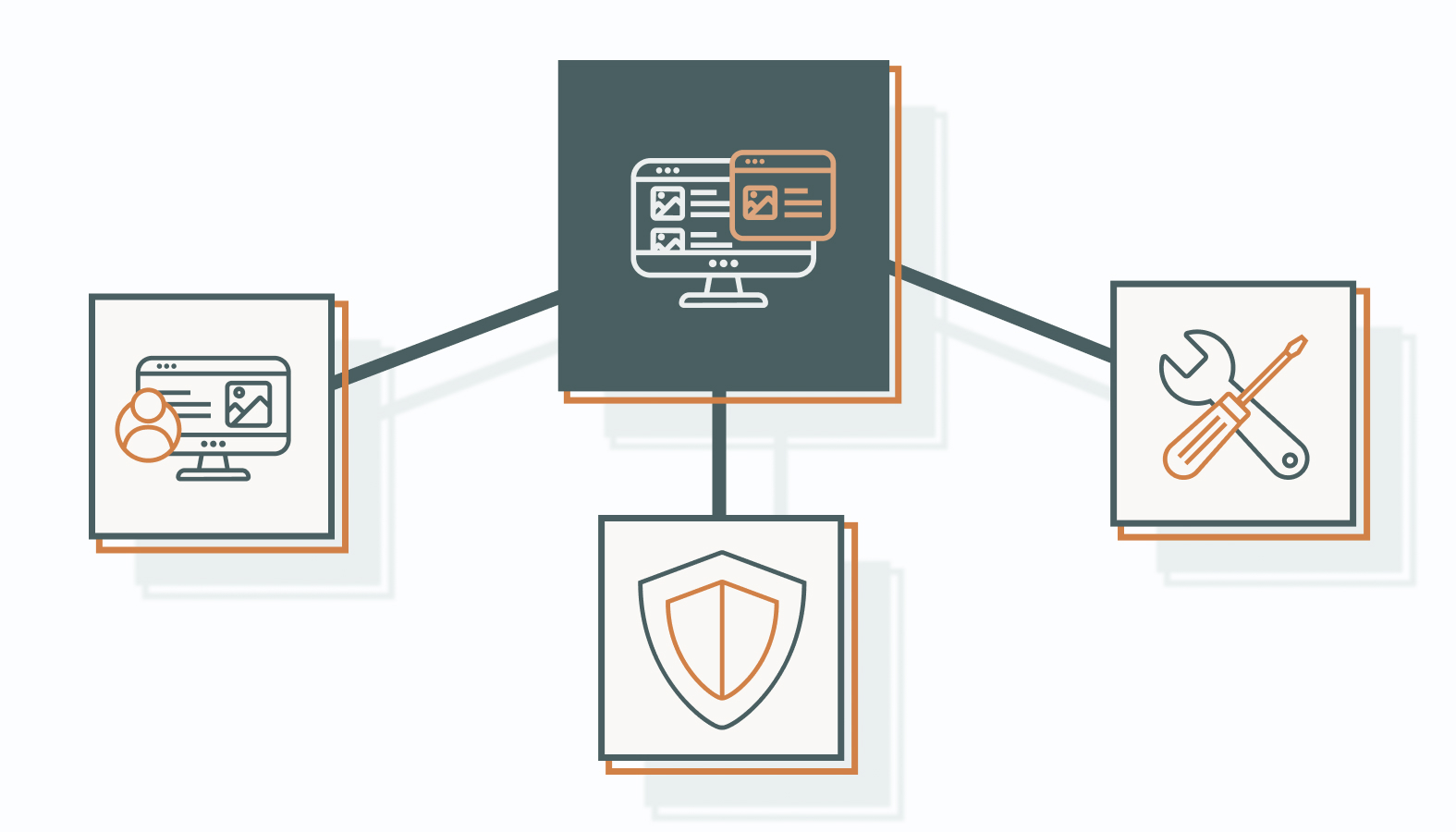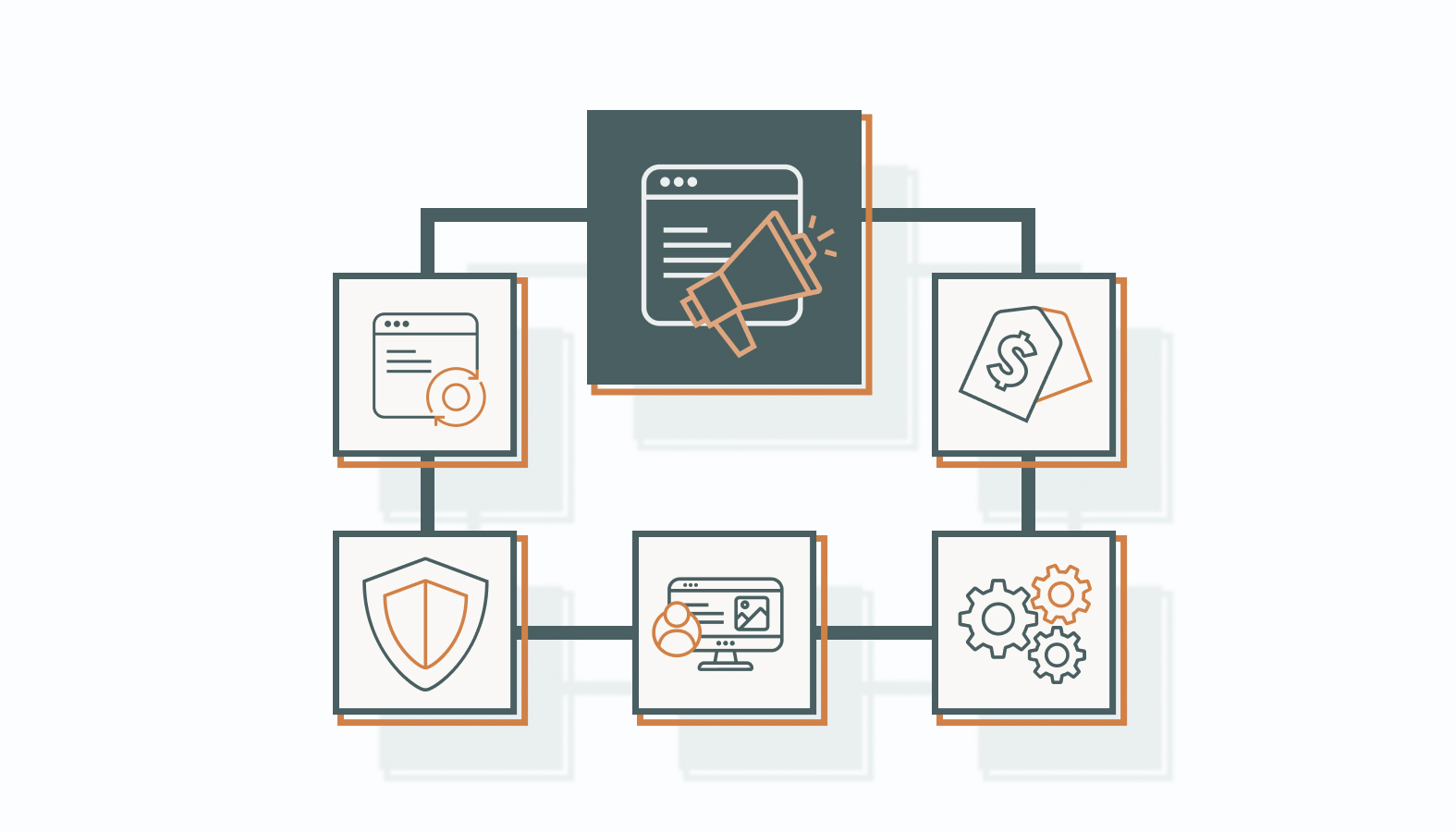Think about how much of your business today depends on digital content. Product descriptions, marketing campaigns, and knowledge hubs all need structure, consistency, and easy updates. Without that, teams waste time, customers get frustrated, and growth stalls.
That’s why so many organizations turn to CMS platforms. The benefits of content management system adoption range from better collaboration and faster publishing to stronger SEO and security. When used well, a CMS simplifies content and reshapes the way a business manages information and interacts with customers.
Of course, adopting a CMS isn’t without its hurdles. Initial setup, integration, and ongoing updates can feel like heavy lifts. But the long-term payoff, from efficiency and scalability to competitive strength, often makes the investment worthwhile.
So, how exactly can a CMS help your business run smoother and grow smarter? Let’s get into it.
Unlocking the Core Benefits of Using a CMS
A Content Management System (CMS) is more than just software. It’s the backbone of how modern businesses handle digital content. It enables efficient content creation and gives businesses the flexibility to keep pace with evolving demands.
Boosting Team Collaboration and Workflow Efficiency
A CMS brings teams onto the same platform, making it easier to create, edit, and publish without confusion. Features like version control and workflow management reduce miscommunication, while real-time editing and commenting keep projects moving without bottlenecks.
Simplifying Content Creation and Management
Creating and managing content shouldn’t require coding knowledge. With intuitive dashboards, drag-and-drop tools, and pre-built templates, a CMS makes publishing faster and less technical. That frees teams to spend more time on strategy and less on formatting and logistics.
Elevating Your SEO Strategy
Search visibility starts with the right foundation. A CMS supports it with built-in SEO tools — metadata management, XML sitemaps, mobile responsiveness, and clean URLs. Some platforms even offer keyword insights that help marketers fine-tune content so it reaches the right audience.
Adapting to Growth with Scalability and Flexibility
Business needs change quickly, and a CMS is built to scale with them.
Whether it’s supporting more users, handling higher traffic, or connecting with other business tools, a CMS can adapt without forcing a complete overhaul. That flexibility makes it a long-term asset for sustainable growth.
Leveraging the Technical Strengths of a CMS
For businesses that rely on digital content, technology isn’t optional—it’s the foundation. A Content Management System (CMS) strengthens that foundation by reshaping how content is:
- Managed – keeping everything organized in one place
Distributed – ensuring content reaches the right audience, on the right channels - Protected – safeguarding data and digital assets with modern security features
These capabilities don’t just support daily operations. They create a stronger digital infrastructure that helps organizations grow with confidence.
Navigating with an Intuitive User Interface
Adoption starts with usability. A CMS with a clunky interface slows teams down, no matter how powerful it looks on paper. An intuitive system makes daily tasks feel straightforward, even for non-technical users.
Key benefits include:
- Drag-and-drop editing – build or adjust pages without touching code.
- Customizable dashboards – each team member can focus on the tools and metrics that matter to their role.
- Streamlined navigation – menus and content paths are structured so users find what they need quickly.
A clear, intuitive interface ensures adoption across teams, speeding up publishing while minimizing errors. The more people who can contribute effectively, the more value the CMS delivers.
Prioritizing Security with Robust Features
In today’s digital environment, a data breach can damage trust faster than any marketing campaign can repair it.
Core security features often include:
- User authentication and permissions – control who can see, edit, or publish content.
- Automatic security updates – patch vulnerabilities before they’re exploited.
- Activity logs – track changes, logins, and content edits for accountability.
Advanced systems also add:
- SSL encryption to secure data transfers
- Firewall integration for network-level protection
- Backup and recovery tools to restore data if something goes wrong
These safeguards go beyond content protection; they preserve trust, compliance, and brand reputation.
Integration with Essential Business Tools
A CMS shouldn’t sit in isolation. To get the most out of it, businesses need a system that integrates with their existing tech stack. When your CMS integrates smoothly with other tools, you reduce manual work and create a single source of truth for data.
Examples of valuable integrations include:
- CRM systems – unify customer data, so marketing and sales work from the same insights.
- Marketing automation platforms – streamline email campaigns, lead nurturing, and personalization.
- Analytics and reporting tools – measure performance directly against content activity.
- E-commerce platforms – manage product descriptions, images, and content updates in one place.
These integrations reduce duplicate work and support collaboration between marketing, sales, operations, and IT.
Considerations and Challenges of CMS
A Content Management System (CMS) delivers clear advantages, but it also introduces challenges that can’t be ignored. Addressing these upfront is critical for adoption, long-term success, and ensuring the system meets both organizational needs and technical realities.
Evaluating Initial Setup and Cost Factors
Implementing a CMS is rarely just plug-and-play. Costs can include licensing, infrastructure, and integration work that quickly add up.
Businesses that skip planning often overspend or end up with features they don’t need. The smarter play is to run a needs assessment, weigh open-source against proprietary options, and focus investment on essentials that deliver impact.
Building scalability into the initial plan prevents expensive fixes later.
Understanding Customization Challenges
Customizing a CMS to specific workflows can be challenging, often requiring complex builds or specialized skills that slow progress.
The most effective way forward is to prioritize modular systems, document every customization, and keep stakeholders in the loop. That balance allows you to shape the CMS to business needs without burying teams under technical debt.
Enhancing User Experience and Accessibility
Configuring for usability means focusing on accessibility features like responsive design, keyboard navigation, and screen reader compatibility. These aren’t just nice-to-haves—they ensure every team member can engage fully, which translates to faster adoption and stronger ROI.
Ensuring Security and Compliance
No CMS strategy is complete without a plan for data protection.
From role-based permissions to encryption and security audits, the system needs to withstand both cyber threats and regulatory requirements.
Compliance frameworks like GDPR and HIPAA demand constant attention, so staying current on changes and updating controls isn’t optional—it’s survival.
Managing Ongoing Maintenance and Updates
A CMS is never “done.” Regular updates, patching, and monitoring are the only way to keep it secure and stable.
The organizations that excel treat maintenance as a routine discipline, not an afterthought. That means scheduling downtime strategically, automating updates where possible, and training staff to spot risks early. The payoff is a system that stays reliable, resilient, and ready to scale.
Future-Proofing with a CMS
A CMS is an adaptable foundation for future growth, but only if adopted strategically. Organizations with clear plans unlock ROI; those without get buried in complexity.
However, no CMS platform is a silver bullet. The advantage comes from aligning the system with your business model, growth targets, and team capabilities. That’s where experience matters.
We’ve helped companies cut through hype and implement CMS strategies that scale with their business, not against it. If you’re ready to rethink your digital foundation, schedule a candid conversation with one of our experts, and let’s build the CMS foundation your competitors will wish they had.









